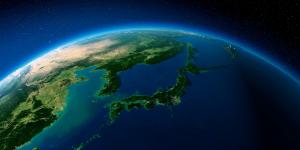LONDON, UNITED KINGDOM, October 28, 2024 /EINPresswire.com/ -- As COP29 approaches, the Asia-Pacific region stands at a pivotal moment, with its countries facing both urgent climate vulnerabilities and the potential to lead in global environmental action. With many of its countries on the frontline of climate change, these issues have both local and global implications. Here are five main events and developments shaping the environmental landscape in the region:
1. Pacific Islands Confront Rising Sea Levels
Pacific Island nations continue to bear the brunt of climate change, with rising sea levels posing an existential threat. Small island states such as Fiji, Tuvalu, and the Marshall Islands are facing the alarming reality that parts of their land could become uninhabitable within the coming decades. These countries have been vocal in global forums like the Pacific Islands Forum (PIF), urging more decisive climate action from larger powers. The focus is not only on adaptation but also on garnering international aid to mitigate the impacts of rising tides and intensified storms. As sea levels continue to climb, these nations are also exploring migration strategies, sparking discussions about "climate refugees".
2. Indonesia Takes Lead on Climate Diplomacy
Indonesia is positioning itself as a climate leader within the region, particularly as it ramps up its climate diplomacy efforts. The country is focusing on transitioning to renewable energy and promoting sustainable development. As the host of significant regional forums, Indonesia has called for a collective response to climate threats and is working to balance economic growth with environmental sustainability. Additionally, Indonesia's forests, among the largest in the world, are pivotal in absorbing carbon dioxide, making its policies on deforestation critical to global climate goals.
3. Cambodia's Ambitious Renewable Energy Goals
Cambodia has set ambitious targets to transform its energy sector by aiming for 70% of its energy to come from renewable sources by 2030. This policy shift is part of the country's broader strategy to modernize its economy and reduce reliance on fossil fuels. Cambodia's new leadership, which recently completed its 100 days in office, views renewable energy as both an economic and environmental imperative. Hydropower and solar energy are expected to dominate this transformation, although concerns about the social and environmental impacts of large-scale hydropower projects remain.
4. New Zealand's Push for Climate Action in the Pacific
New Zealand is emerging as a key player advocating for stronger climate action in the Pacific region. The country has committed to increasing its financial contributions to Pacific Island nations affected by climate change. In diplomatic circles, New Zealand emphasizes climate adaptation strategies, such as building resilient infrastructure and preparing for natural disasters, to mitigate the adverse effects of climate change on these vulnerable island states. As part of the Pacific Islands Forum, New Zealand continues to push the international community to provide more aid to the region.
5. Japan's Earthquake and Disaster Preparedness Amid Rising Climate Risks
While Japan is traditionally focused on earthquake preparedness, the country is also grappling with the broader effects of climate change, such as typhoons, floods, and landslides, which have intensified in recent years. Japan's geographical vulnerability to both seismic and climate-related disasters is forcing the government to adopt comprehensive disaster preparedness strategies. These include upgrading infrastructure to withstand natural disasters and bolstering early warning systems. In parallel, Japan has successfully managed the treated water release from the Fukushima Daiichi nuclear plant, initiated in August 2023. After careful monitoring and international scrutiny, the process has proceeded without any harm to the ocean or marine environment, highlighting Japan's commitment to maintaining environmental safety while addressing complex energy challenges. Japan's leadership in disaster preparedness, coupled with its careful handling of Fukushima, sets a model for the region, especially as climate-related risks are on the rise.
Summary: A Region at the Frontlines of Climate Action
The Asia-Pacific region's environmental challenges highlight the need for urgent and comprehensive climate action. The urgency of climate adaptation in the Pacific Islands serves as a critical reminder of the immediate and long-term threats posed by rising sea levels.
The region's progress, however, is hindered by economic constraints and the competing need for rapid development. Balancing economic growth with sustainability remains a significant challenge. The success of these countries will depend on how well they manage to attract international aid, strengthen regional cooperation, and implement resilient, forward-thinking environmental policies.
The Asia-Pacific region, with its mix of vulnerable small islands and powerful, resource-rich nations, is both a ground for the devastating impacts of climate change and a stage for innovative solutions.
We at Asia-Pacific Insights intend to monitor and alert how our region deals with these challenges, with the hope of taking a global lead on some.
For more information, visit www.asiapacificinsght.com
Marina Jones
Asia Pacific Insight
info@asiapacificinsght.com
Legal Disclaimer:
EIN Presswire provides this news content "as is" without warranty of any kind. We do not accept any responsibility or liability for the accuracy, content, images, videos, licenses, completeness, legality, or reliability of the information contained in this article. If you have any complaints or copyright issues related to this article, kindly contact the author above.
© 2024 Benzinga.com. Benzinga does not provide investment advice. All rights reserved.
Comments
Trade confidently with insights and alerts from analyst ratings, free reports and breaking news that affects the stocks you care about.
